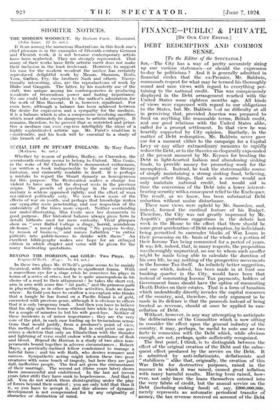FINANCE-PUBLIC & PRIVATE.
[BY OUR CITY EDITOR.]
DEBT REDEMPTION AND COMMON
SENSE.- [To the Editor of the SPECTATOR.] SIR,—The City has a way of pretty accurately sizing up our various statesmen—or should the expression to-day be politicians ? And it is generally admitted in financial circles that the ex-Premier, Mr. Baldwin, commands respect for what may be termed his thoroughly sound and sane views with regard to everything per- taining to the national credit. This was conspicuously displayed in the Debt arrangement reached with the United States some eighteen months ago. All kinds of views were expressed with regard to our obligations to the States, but Mr. Baldwin had no difficulty at all in perceiving that, provided America was prepared to fund on anything like reasonable terms, British credit, and our good relations with the United States alike, called for a prompt settlement. In that view he was heartily supported by City opinion. Similarly, in the matter of Debt redemption, Mr. Baldwin never gave ear for a moment either to the campaign for a Capital Levy or any other extraordinary measures to rapidly reduce the Debt, or to the theories so eloquently expounded at the present moment by Mr. Keynes for treating the Debt in light-hearted fashion and abandoning sinking funds, to provide money for promoting work for the unemployed. Instead, he took the statesmanlike course of simply maintaining a strong sinking fund, believing, amongst other things, that such a course would not only maintain _national credit, but would aid in time the conversion of the Debt into a lower interest- bearing security with a consequent relief to the Exchequer. The result, as we know, has been substantial Debt reduction without undue disturbance.
These sane views were upheld by Mr. Snowden, and, indeed, formed the cardinal feature of his Budget. Therefore, the City was not greatly impressed by Mr. Asquith's gratuitous suggestions in the debate last week in the House to the effect that -there should be some great acceleration of Debt redemption, by individuals being_ permitted to surrender " blocks _of War, Loans in their possession on the basis of the whole or a portion of their was Tax being commuted for a _period of_ y-ears. It was felt, indeed, that, in many respects, the proposition was thoroughly unpractical, no one to whom such an offer might be made being able to calculate the duration of his own life, to say nothing of the prospective movements in the Income Tax itself. An infinitely better suggestion, and one which, indeed,' has been made in at least one banking quarter in the City, would have been that instead of commuting Income Tax payments, holders of Government loans should have the option of commuting Death Duties on their estates. That is a form of taxation which undoubtedly directly invades the capital resources of the country, and, therefore, the only argument to be made in its defence is that the proceeds instead of being treated as revenue, should at once be applied to can- cellation of Debt.
Without, however, in any way. attempting to anticipate the deliberations of the Committee which is now sitting to consider the effect upon the general industry of the country, it may, perhaps, be useful to note one or two facts-in-connexion with the Debt which, 'while obvious enough, are not, perhaps, quite sufficiently recognized. The first point, I think,is to distinguish between the effect of the :original creation of the Debt and the subse- quent effect produced by the service on the Debt. It is admitted by anti-inflationists, deflationists and " stabilizers " alike that, originally, the creation of this War Debt for destructive purposes, raised in the manner in which it was raised, caused great inflation with many harmful results. Having been raised, how- ever, not only have the loans themselves entered into the very fabric of credit, but the annual service on the Debt (including sinking fund) of, say, £300,000,009, merely represents an automatic periodical transfer of money, the tax revenue received on account of the Debt being disbursed in the shape of dividends almost as rapidly as it is received—in some cases even more rapidly. Incidentally, teo, it is, perhaps, worth- noting that the total sum received in Income and Super Tax alone more than exceeds the; annual service on the Debt, while if the estate duties were added, the total is far exceeded.
Now, apart from all considerations of equity, and looking at the matter strictly from the financial stand- point, it will be seen that any great and sudden wiping off of the Debt, such, for example, as is involved in a Capital Levy, would occasion the most serious financial and commercial dislocation, while, in many directions its effects would be similar to those associated with violent deflation. In other words, if the service of the Debt in itself involves less strain upon industry than what may be termed fresh expenditure of an unproductive character, it follows that gradual rather than heroic and violent methods for reducing the Debt are likely to be those most conducive to the financial well-being of the community. That is why, therefore, the City approves of the sane methods of Debt extinction laid down by MT. Baldwin and so far upheld by Mni Snowden in his Budget, and why it disapproves alike of Mr. Asquith's proposals for greater acceleration of Debt redemption and of the suggestions of those who would, for the time being, disregard Debt redemption altogether. —I am, Sir, yours faithfully, ARTHUR W. KIDDY. The City, June 4th.











































 Previous page
Previous page